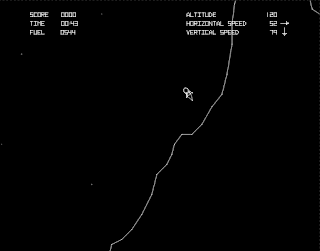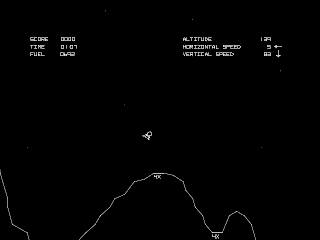Out of most of the games that continue to frustrate me, Lunar Lander is one of the worst. Not that it's really a bad game but that out of all the games that I don't like, this one almost takes the cake.
 |
| Nobody likes this kind of "winner." |
Before reading about the games history, the vector graphics did not really appeal to me; though it did make it look interesting, in my opinion, they could have easily done this with a conventional graphics system for the time. After learning about it being on early computers years before making it to the arcades it did make sense, for convenience sake, to make it a direct port.
 |
| Crap, crap, crap, CRAP! |
This game takes a lot of concentration, taking both the conditions you're under (gravity, atmospheric friction), the velocity of the craft, the altitude, the desired landing site, fuel level, etc. I feel like a real astronaut trying to land a spacecraft safely (and find the nearest McDonalds); for that reason, I feel totally unqualified to make a landing. At least, I get that feeling by the tenth attempt. On the training level.
 |
| No one can hear you scream in space...as you blow this landing AGAIN!! |
One day I will muster the fortitude, patience, and concentration to finally land this thing anywhere and not be so bitter. Until then, I will continue to say this game is inaccessible due to its difficulty and the number of things that you have to be watching.
Final Judgment: 5/10




















